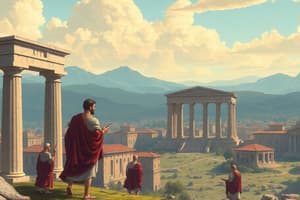Podcast
Questions and Answers
Which of the following describes the Homeric or Heroic Period of Greek literature?
Which of the following describes the Homeric or Heroic Period of Greek literature?
- An era of legendary heroes and epic poetry transmitted orally (correct)
- A period of lyrical poetry and personal expression
- A time of philosophical and scientific inquiry
- A phase of experimental and unconventional literary forms
What was the primary emphasis of the Classical Period in Western literature?
What was the primary emphasis of the Classical Period in Western literature?
- Emotion and passion
- Experimentation and avant-garde techniques
- Order, reason, and the pursuit of knowledge (correct)
- Individualism and self-expression
What was the primary reason for the fluidity and adaptability of the oral tradition during the Homeric or Heroic Period?
What was the primary reason for the fluidity and adaptability of the oral tradition during the Homeric or Heroic Period?
- The influence of the Classical Period's emphasis on order and reason
- The desire of storytellers to constantly innovate and experiment with the tales
- The lack of a dominant cultural center that could standardize the oral tradition
- The lack of a written language system capable of capturing the nuances of the narratives (correct)
How did the transition from oral to written tradition affect the legacy of Homer's epics?
How did the transition from oral to written tradition affect the legacy of Homer's epics?
How did the oral tradition contribute to the preservation and dissemination of the epics during the Homeric or Heroic Period?
How did the oral tradition contribute to the preservation and dissemination of the epics during the Homeric or Heroic Period?
What was the significance of the Homeric epics in the development of Western literature?
What was the significance of the Homeric epics in the development of Western literature?
Which ancient Greek epic poems are considered monumental achievements in literature during the Classical Period?
Which ancient Greek epic poems are considered monumental achievements in literature during the Classical Period?
Who were the Athenian playwrights that pioneered the genre of Greek tragedy during the Classical Period?
Who were the Athenian playwrights that pioneered the genre of Greek tragedy during the Classical Period?
Which Roman poet is famous for his epic poem 'The Aeneid' that aimed to establish a Roman national epic?
Which Roman poet is famous for his epic poem 'The Aeneid' that aimed to establish a Roman national epic?
Who among the following ancient philosophers had a significant influence on literary theory during the Classical Period?
Who among the following ancient philosophers had a significant influence on literary theory during the Classical Period?
Which concept proposed by Aristotle had a lasting impact on dramatic works for centuries to come?
Which concept proposed by Aristotle had a lasting impact on dramatic works for centuries to come?
Which Roman figure is known for his speeches that shaped persuasive communication during the Classical Period?
Which Roman figure is known for his speeches that shaped persuasive communication during the Classical Period?
Flashcards are hidden until you start studying
Study Notes
The Classical Period (1200 BCE-455 CE)
- The Classical Period is a pivotal epoch in the historical development of literature, spanning from approximately 1200 BCE to 455 CE.
- This era is characterized by the flourishing of ancient civilizations such as Greece and Rome, each leaving an enduring legacy on the literary landscape.
Ancient Greece
- Epic poems played a prominent role, with Homer's "Iliad" and "Odyssey" standing as monumental achievements.
- These works not only showcased the prowess of oral storytelling but also laid the groundwork for Western literature.
- Athenian playwrights, including Aeschylus, Sophocles, and Euripides, pioneered the genre of Greek tragedy, exploring profound themes of fate, morality, and the human condition.
- Philosophy was born in Greece, with luminaries like Plato and Aristotle contributing to philosophical discourse and influencing literary theory.
- Aristotle's notion of tragedy and the three unities (time, place, and action) had a lasting impact on dramatic works for centuries to come.
Ancient Rome
- The literary tradition evolved with the epic poetry of Virgil, exemplified by the "Aeneid," which sought to establish a Roman national epic akin to the Greek classics.
- Roman oratory and rhetoric flourished during this period, as seen in the speeches of Cicero, shaping the art of persuasive communication, and influencing later writers.
Legacy of the Classical Period
- The Classical Period laid the groundwork for the Western literary tradition, setting the stage for subsequent periods.
- The legacy of the Classical Period can be seen in the continued reverence for ancient works, their incorporation into educational curricula, and their enduring influence on the foundations of literature and intellectual thought.
Homeric or Heroic Period (1200-800 BCE)
- This period marks the earliest phase of Greek literature, characterized by legendary heroes and epic poetry transmitted orally.
- Homer's "The Iliad" and "The Odyssey" are notable works from this period, narrating the heroic deeds of figures like Achilles and Odysseus.
- The oral tradition played a crucial role in preserving and disseminating these tales, contributing to the rich cultural heritage of ancient Greece.
- Homer, the enigmatic figure credited with composing these epics, is believed to have lived in Ionia, an ancient region along the coast of present-day Turkey, during the early 9th or late 8th century BCE.
Studying That Suits You
Use AI to generate personalized quizzes and flashcards to suit your learning preferences.




